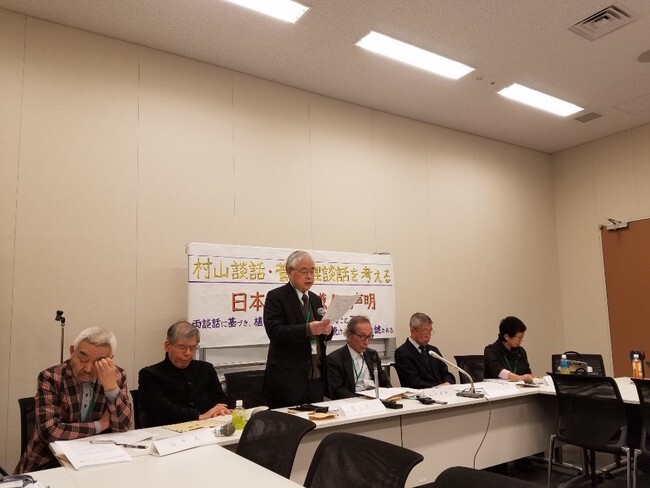hankyoreh
Links to other country sites 다른 나라 사이트 링크
Japanese intellectuals advocate for apologizing for colonial rule to mend Korea-Japan relations

On the 100th anniversary of the Mar. 1st Movement, a number of Japanese intellectuals have released a statement arguing that “reflection and apology for the colonial occupation [of Korea] is the key to developing Japan-South Korea and Japan-North Korea relations.”
Scholars such as University of Tokyo Professor Emeritus Haruki Wada, Keisen University Professor Emeritus Utsumi Aiko and Hitotsubashi University Professor Hiroshi Tanaka held a press conference at the House of Representatives meeting hall in Tokyo on Feb. 6 in which they released the 2019 Statement from Japanese Citizens and Intellectuals. The statement was signed by 226 persons.
They stressed that both the Murayama Statement (1995) by then Prime Minister Tomiichi Murayama on the anniversary of the end of World War II, which contained reflections on Japan’s colonial occupation of the Korean Peninsula, and the Kan Statement (2010) by then Prime Minister Naoto Kan on the 100th anniversary of the Japanese annexation of Korea, which was the first time a Japanese prime minister acknowledged that colonial occupation was against the wishes of the Korean people, should be upheld and developed in order to develop Japan-South Korea and Japan-North Korea relations.
“Sincere discussions with a fresh mind must take place on the remaining issues between Japan and the Republic of Korea and Japan and the Democratic People's Republic of Korea [North Korea], with the Murayama Statement and Kan Statement serving as the foundation,” the statement read. “Above all, action must be taken now for the sake of North Korean victims of sex slavery.” The statement also called for a more serious response to the issue of “conscripted workers,” or victims of forced labor during WWII.
“This is the year we commemorate the 100th anniversary of the Mar. 1st Declaration of Independence by Korea. Even after being annexed to Japan and enduring 10 years of suffering, the Korean people sought to convince the Japanese that Joseon [Korea] needed to be independent, if only for the sake of Japan. It is time for us [the Japanese people] to listen to this grand voice of persuasion and choose the path of mutual understanding and mutual aid between Japan and South Korea and Japan and North Korea, based on reflection and apology for the colonial occupation.”
During the press conference, professor Wada stated, “The Murayama Statement and Kan Statement represent great progress for Japan since losing the war. However, people are forgetting about the Kan Statement, which mentioned the March 1st Movement. The foundations of Japan (in terms of Korea-Japan relations) are now being shaken, which is why we released this statement.”
Professor Tanaka added “Japan is very emotional [about the Korean Supreme Court’s judgment on compensation for forced laborers]. The decision of the Korean Supreme Court was initially released in 2012 [after being reversed], and was confirmed in the most recent judgment. Things were quiet in 2012, but recently there has been an atmosphere of Korea-bashing. This is very worrisome.”
In 2010, a number of Japanese scholars including Wada released the Joint Statement by Japanese and Korean Intellectuals along with Korean scholars on the 100th anniversary of Japan’s annexation of Korea. The statement, which was signed by 500 individuals, read, “All the processes to do with the annexation of Korea were unjust and wrongful. The Treaty of Annexation is unjust and wrongful.” Regarding the fact that a joint statement was not adopted on this occasion, Wada said, “Recognition [of past history] is receding across Japan as a whole, so the purpose of this statement is to urge Japan to check its principles first.”
By Cho Ki-weon, Tokyo correspondent
Please direct comments or questions to [english@hani.co.kr]

Editorial・opinion
![[Column] Park Geun-hye déjà vu in Yoon Suk-yeol [Column] Park Geun-hye déjà vu in Yoon Suk-yeol](https://flexible.img.hani.co.kr/flexible/normal/500/300/imgdb/original/2024/0424/651713945113788.jpg) [Column] Park Geun-hye déjà vu in Yoon Suk-yeol
[Column] Park Geun-hye déjà vu in Yoon Suk-yeol![[Editorial] New weight of N. Korea’s nuclear threats makes dialogue all the more urgent [Editorial] New weight of N. Korea’s nuclear threats makes dialogue all the more urgent](https://flexible.img.hani.co.kr/flexible/normal/500/300/imgdb/original/2024/0424/7317139454662664.jpg) [Editorial] New weight of N. Korea’s nuclear threats makes dialogue all the more urgent
[Editorial] New weight of N. Korea’s nuclear threats makes dialogue all the more urgent- [Guest essay] The real reason Korea’s new right wants to dub Rhee a founding father
- [Column] ‘Choson’: Is it time we start referring to N. Korea in its own terms?
- [Editorial] Japan’s rewriting of history with Korea has gone too far
- [Column] The president’s questionable capacity for dialogue
- [Column] Are chaebol firms just pizza pies for families to divvy up as they please?
- [Column] Has Korea, too, crossed the Rubicon on China?
- [Correspondent’s column] In Japan’s alliance with US, echoes of its past alliances with UK
- [Editorial] Does Yoon think the Korean public is wrong?
Most viewed articles
- 1‘We must say no’: Seoul defense chief on Korean, USFK involvement in hypothetical Taiwan crisis
- 2Will NewJeans end up collateral damage in internal feud at K-pop juggernaut Hybe?
- 3[Column] Park Geun-hye déjà vu in Yoon Suk-yeol
- 4Why Korea shouldn’t welcome Japan’s newly beefed up defense cooperation with US
- 5Thursday to mark start of resignations by senior doctors amid standoff with government
- 6N. Korean hackers breached 10 defense contractors in South for months, police say
- 7[Guest essay] The real reason Korea’s new right wants to dub Rhee a founding father
- 8[Column] ‘Choson’: Is it time we start referring to N. Korea in its own terms?
- 9Kim Jong-un expressed ‘satisfaction’ with nuclear counterstrike drill directed at South
- 10[Editorial] New weight of N. Korea’s nuclear threats makes dialogue all the more urgent